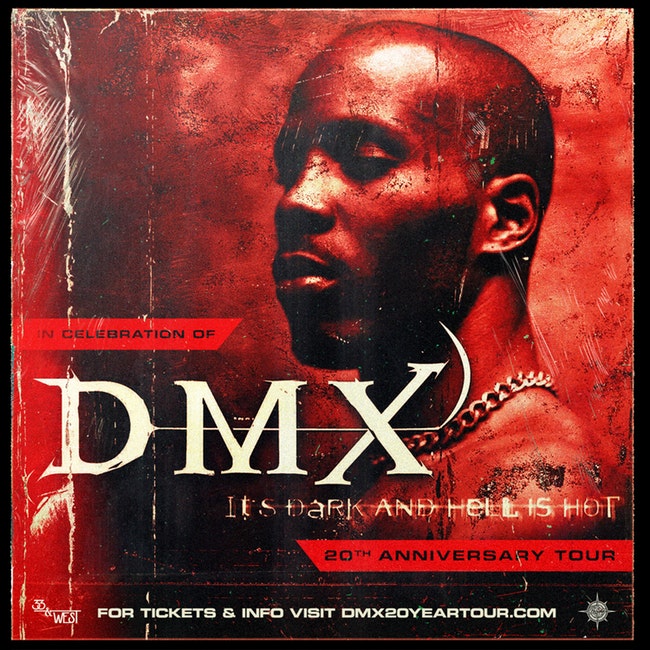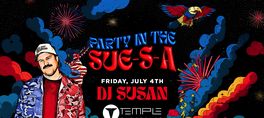Following the deaths of Tupac Shakur and the Notorious B.I.G., DMX took over as the undisputed reigning king of hardcore rap. He was that rare commodity: a commercial powerhouse with artistic and street credibility to spare. His rapid ascent to stardom was actually almost a decade in the making, which gave him a chance to develop the theatrical image that made him one of rap's most distinctive personalities during his heyday. Everything about DMX was unremittingly intense, from his muscular, tattooed physique to his gruff, barking delivery, which made a perfect match for his trademark lyrical obsession with dogs. Plus, there was substance behind the style; much of his work was tied together by a fascination with the split between the sacred and the profane. He could move from spiritual anguish one minute to a narrative about the sins of the streets the next, yet keep it all part of the same complex character, sort of like a hip-hop Johnny Cash. The results were compelling enough to make DMX the first artist ever to have his first four albums enter the charts at number one.
DMX was born Earl Simmons in Baltimore, Maryland, on December 18, 1970. He moved with part of his family to the New York City suburb of Yonkers while still a young child. A troubled and abusive childhood turned him violent, and he spent a great deal of time living in group homes and surviving on the streets via robbery, which led to several run-ins with the law. He found his saving grace in hip-hop, starting out as a DJ and human beatbox, and later moved into rapping for a greater share of the spotlight, taking his name from the DMX digital drum machine (though it's also been reinterpreted to mean "Dark Man X"). He made a name for himself on the freestyle battle scene and was written up in The Source magazine's Unsigned Hype column in 1991. Columbia subsidiary Ruffhouse signed him to a deal the following year and released his debut single, "Born Loser."
show less
DMX was born Earl Simmons in Baltimore, Maryland, on December 18, 1970. He moved with part of his family to the New York City suburb of Yonkers while still a young child. A troubled and abusive childhood turned him violent, and he spent a great deal of time living in group homes and surviving on the streets via robbery, which led to several run-ins with the law. He found his saving grace in hip-hop, starting out as a DJ and human beatbox, and later moved into rapping for a greater share of the spotlight, taking his name from the DMX digital drum machine (though it's also been reinterpreted to mean "Dark Man X"). He made a name for himself on the freestyle battle scene and was written up in The Source magazine's Unsigned Hype column in 1991. Columbia subsidiary Ruffhouse signed him to a deal the following year and released his debut single, "Born Loser."
Following the deaths of Tupac Shakur and the Notorious B.I.G., DMX took over as the undisputed reigning king of hardcore rap. He was that rare commodity: a commercial powerhouse with artistic and street credibility to spare. His rapid ascent to stardom was actually almost a decade in the making, which gave him a chance to develop the theatrical image that made him one of rap's most distinctive personalities during his heyday. Everything about DMX was unremittingly intense, from his muscular, tattooed physique to his gruff, barking delivery, which made a perfect match for his trademark lyrical obsession with dogs. Plus, there was substance behind the style; much of his work was tied together by a fascination with the split between the sacred and the profane. He could move from spiritual anguish one minute to a narrative about the sins of the streets the next, yet keep it all part of the same complex character, sort of like a hip-hop Johnny Cash. The results were compelling enough to make DMX the first artist ever to have his first four albums enter the charts at number one.
DMX was born Earl Simmons in Baltimore, Maryland, on December 18, 1970. He moved with part of his family to the New York City suburb of Yonkers while still a young child. A troubled and abusive childhood turned him violent, and he spent a great deal of time living in group homes and surviving on the streets via robbery, which led to several run-ins with the law. He found his saving grace in hip-hop, starting out as a DJ and human beatbox, and later moved into rapping for a greater share of the spotlight, taking his name from the DMX digital drum machine (though it's also been reinterpreted to mean "Dark Man X"). He made a name for himself on the freestyle battle scene and was written up in The Source magazine's Unsigned Hype column in 1991. Columbia subsidiary Ruffhouse signed him to a deal the following year and released his debut single, "Born Loser."
read more
DMX was born Earl Simmons in Baltimore, Maryland, on December 18, 1970. He moved with part of his family to the New York City suburb of Yonkers while still a young child. A troubled and abusive childhood turned him violent, and he spent a great deal of time living in group homes and surviving on the streets via robbery, which led to several run-ins with the law. He found his saving grace in hip-hop, starting out as a DJ and human beatbox, and later moved into rapping for a greater share of the spotlight, taking his name from the DMX digital drum machine (though it's also been reinterpreted to mean "Dark Man X"). He made a name for himself on the freestyle battle scene and was written up in The Source magazine's Unsigned Hype column in 1991. Columbia subsidiary Ruffhouse signed him to a deal the following year and released his debut single, "Born Loser."
show less
Date/Times:
The UC Theatre
24 Upcoming Events
2036 University Avenue, Berkeley, CA 94704
The Best Events
Every Week in Your Inbox
From Our Sponsors
UPCOMING EVENTS
Great suggestion! We'll be in touch.
Event reviewed successfully.









